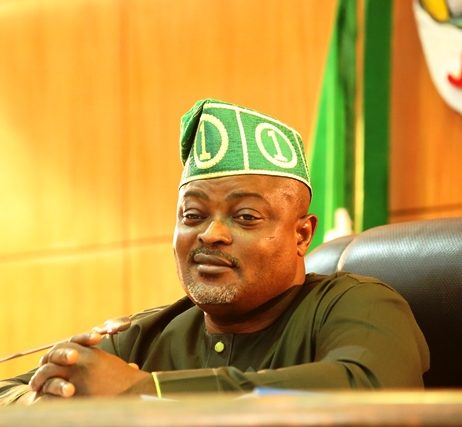The embattled lawmakers of the Lagos State House of Assembly have written an apology letter to President Bola Tinubu, following intense political pressure to reverse their recent decision to impeach former Speaker Mudashiru Obasa. The unprecedented move came after a heated directive from the Governor’s Advisory Council (GAC), the highest decision-making body within the Lagos chapter of the All Progressives Congress (APC).
The decision to remove Obasa, who had served as Speaker for several years, sparked an internal rift within the APC, igniting a firestorm of discord among party leaders. The crisis reached new heights when Tinubu reportedly expressed dissatisfaction with the impeachment and instructed that Obasa be reinstated to avoid further destabilization within the state’s political structure.
In a dramatic turn of events, the Lagos lawmakers gathered for a meeting at the Lagos House, Marina, late Monday night, where they formally expressed their regrets in two separate apology letters to the President.
Tensions Within the APC Leadership
The impeachment of Obasa on January 13, 2025, which followed allegations of misconduct, abuse of office, and financial mismanagement, had been initiated by a majority of the lawmakers. This action, however, drew immediate criticism from within the party, especially from key GAC members like Senator Anthony Adefuye and Chief Muraina Taiwo, who deemed the move illegal and politically reckless.
One insider, speaking on condition of anonymity, noted, “There was a sharp division within the GAC regarding the impeachment. While some felt that Obasa’s removal was justified, others, including the President, believed that the decision had not been adequately coordinated with key party figures. It was a messy affair.”
The disagreement in the ranks of the Lagos APC intensified as a political showdown unfolded between party elders. Some GAC members accused their colleagues of undermining party unity and acting without informing higher authorities about the impeachment. A source revealed, “The President’s stance was clear: Obasa’s removal should be reversed, and his reinstatement would ensure stability within the party.”
The Apology Letters: A Strategic Move
As per the GAC’s directive, the lawmakers immediately penned two apology letters addressed to President Tinubu. The first letter expressed regret for impeaching Obasa without consulting party leadership, promising that the move would be reconsidered and transformed into a resignation instead. The second letter, signed by 17 of the 20 lawmakers from Lagos West, endorsed the continuation of Hon. Mojisola Meranda’s term as Speaker while acknowledging the zoning formula and the importance of maintaining party discipline.
“It was clear that while some lawmakers did not support Obasa’s reinstatement, the President’s directive was non-negotiable,” the insider continued. “The apology was a tactical move to secure a soft landing for the embattled speaker, avoiding deeper political fallout.”
The friction between Governor Babajide Sanwo-Olu and the President was particularly notable. Despite publicly adhering to the President’s directive, sources claim that Governor Sanwo-Olu harbors reservations about Obasa’s return. “Sanwo-Olu doesn’t want to openly defy Tinubu, but he has made his position clear behind closed doors. He fears the consequences of this decision,” a source close to the Governor revealed.
Further complicating the matter, political protests have reportedly erupted on Lagos Island, the hometown of the new Speaker, Mojisola Meranda. Local leaders, aligned with Meranda, have expressed dissatisfaction with the possibility of Obasa’s reinstatement. “There are high-profile figures on Lagos Island leading these protests,” said a source familiar with the developments. “They are demanding that the new status quo be maintained, and they see Obasa’s return as a threat to the power dynamics that favor them.”
A Divided Party
The division within the Lagos APC has become glaring. While some leaders have openly criticized the removal of Obasa, others have remained silent, and a few have outrightly supported the move to reinstate him. The discord within the party leadership was exemplified by the sharp public exchange between Senator Musiliu Obanikoro, who dismissed the opposition as “childish,” and his counterparts, who feared that bypassing party structures could lead to further instability.
Lagos State, a political stronghold for APC, is now at a crossroads. The political fallout from Obasa’s impeachment and the subsequent push for his reinstatement reveals the deep fractures in a party that has long dominated the state’s political landscape. The calls for party unity have never been more urgent, yet the clashing interests continue to widen the divide.
The President’s Influence
President Tinubu’s involvement in the crisis highlights his continued influence over Lagos politics. His decision to intervene and instruct the reinstatement of Obasa was likely aimed at maintaining cohesion within the APC, particularly with the 2025 governorship election looming on the horizon. A source with knowledge of the President’s thinking shared, “Tinubu is well aware that any prolonged instability in Lagos could ripple through the entire APC structure. He wants to ensure that the party remains united as it heads into critical elections, and that means preserving Obasa’s position temporarily.”
Looking Ahead: Political Calculations and Leadership Struggles
As the political drama continues to unfold in Lagos, the lawmakers’ apology letters may only be the beginning of a more complex political struggle. The GAC is expected to meet again in the coming days to review the situation and consider the President’s response. However, with key figures like Sanwo-Olu allegedly working against Obasa’s reinstatement, it is clear that the battle for Lagos’ political future is far from over.
The ongoing developments will certainly keep Lagosians on edge, as the city’s political elite weighs the cost of reconciliation against the potential for further conflict. As one observer put it, “In politics, nothing is ever settled until it’s settled, and for now, nothing has been resolved in Lagos.”

